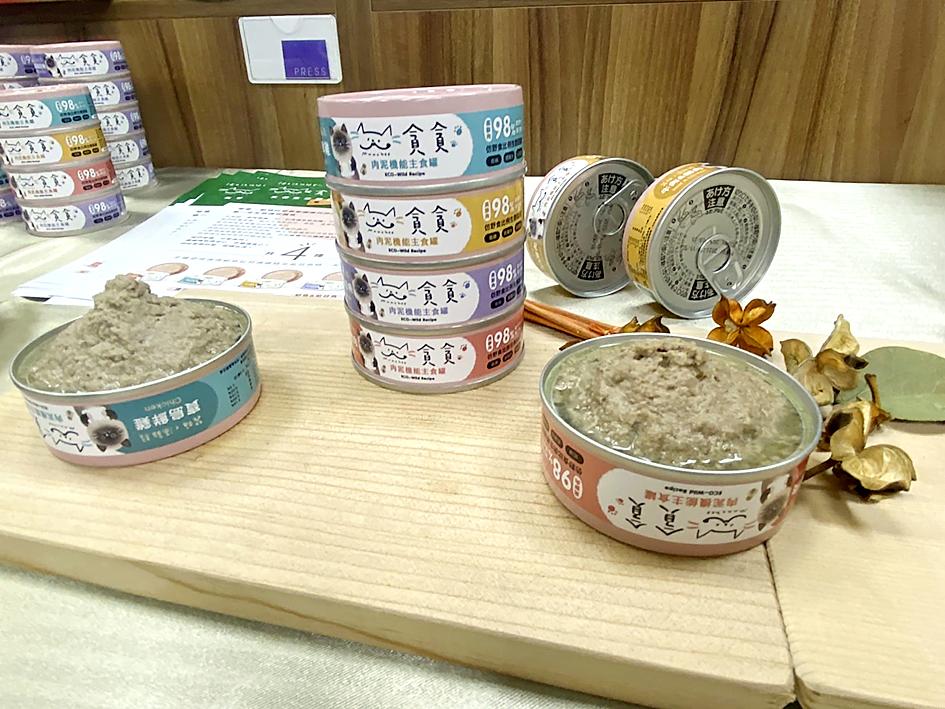A Miaoli County-based agricultural research agency has created a technique for making canned cat food from silkworm pupae, which helps prevent the growth of harmful intestinal bacteria and reportedly eliminates the smell of cat feces.
The Council of Agriculture’s Miaoli District Agricultural Research and Extension Station unveiled the results at a news conference on Wednesday, citing a report by the Taiwan Institute of Economic Research that there were about 1 million pet cats in the nation last year.
Taiwan’s first canned cat food made from silkworm pupae was developed using domesticated silkworm, Bombyx mori, which has an innate immune system that produces antimicrobial peptides — a group of immune proteins that protect the host from infection — during the cocoon phase, station director Lu Hsiu-ying (呂秀英) said.

Photo: CNA
Silkworm pupae are a good source of protein because they contain crude protein, crude lipids, carbohydrates and chitin, she said, adding that they also have high levels of essential amino acids and are rich in omega-3 alpha-linolenic acid.
More than 70 percent of cat owners said they would consider feeding their pet the silkworm pupae, the agricultural research station said, citing a survey of cat owners.
Some owners in trials reported that after eating the new cat food their pet’s feces was less smelly, their fur more luxuriant and they had a bigger appetite, the station said.
The method for making the cat food has been transferred to a biotechnology company for mass production, it said.

Alain Robert, known as the "French Spider-Man," praised Alex Honnold as exceptionally well-prepared after the US climber completed a free solo ascent of Taipei 101 yesterday. Robert said Honnold's ascent of the 508m-tall skyscraper in just more than one-and-a-half hours without using safety ropes or equipment was a remarkable achievement. "This is my life," he said in an interview conducted in French, adding that he liked the feeling of being "on the edge of danger." The 63-year-old Frenchman climbed Taipei 101 using ropes in December 2004, taking about four hours to reach the top. On a one-to-10 scale of difficulty, Robert said Taipei 101

Nipah virus infection is to be officially listed as a category 5 notifiable infectious disease in Taiwan in March, while clinical treatment guidelines are being formulated, the Centers for Disease Control (CDC) said yesterday. With Nipah infections being reported in other countries and considering its relatively high fatality rate, the centers on Jan. 16 announced that it would be listed as a notifiable infectious disease to bolster the nation’s systematic early warning system and increase public awareness, the CDC said. Bangladesh reported four fatal cases last year in separate districts, with three linked to raw date palm sap consumption, CDC Epidemic Intelligence

US climber Alex Honnold left Taiwan this morning a day after completing a free-solo ascent of Taipei 101, a feat that drew cheers from onlookers and gained widespread international attention. Honnold yesterday scaled the 101-story skyscraper without a rope or safety harness. The climb — the highest urban free-solo ascent ever attempted — took just more than 90 minutes and was streamed live on Netflix. It was covered by major international news outlets including CNN, the New York Times, the Guardian and the Wall Street Journal. As Honnold prepared to leave Taiwan today, he attracted a crowd when he and his wife, Sanni,

Taiwanese and US defense groups are collaborating to introduce deployable, semi-autonomous manufacturing systems for drones and components in a boost to the nation’s supply chain resilience. Taiwan’s G-Tech Optroelectronics Corp subsidiary GTOC and the US’ Aerkomm Inc on Friday announced an agreement with fellow US-based Firestorm Lab to adopt the latter’s xCell, a technology featuring 3D printers fitted in 6.1m container units. The systems enable aerial platforms and parts to be produced in high volumes from dispersed nodes capable of rapid redeployment, to minimize the risk of enemy strikes and to meet field requirements, they said. Firestorm chief technology officer Ian Muceus said